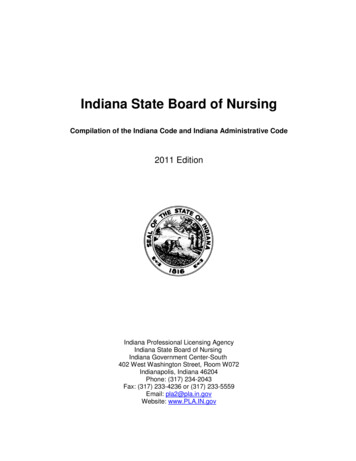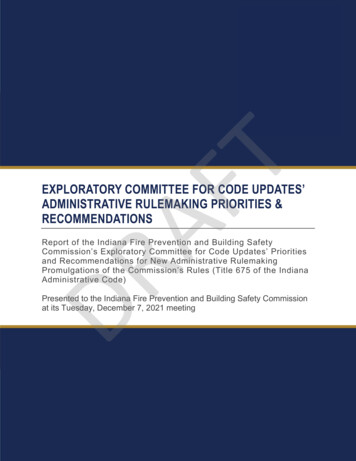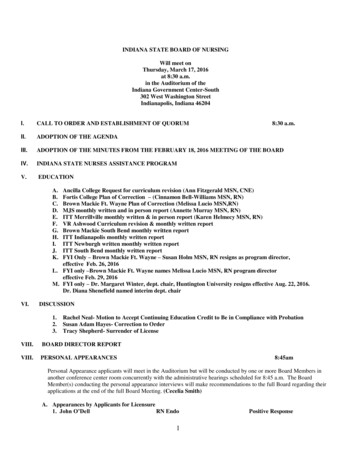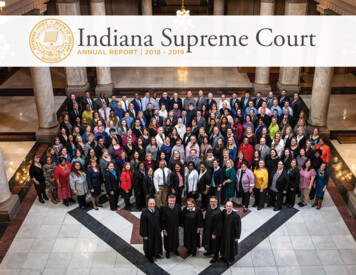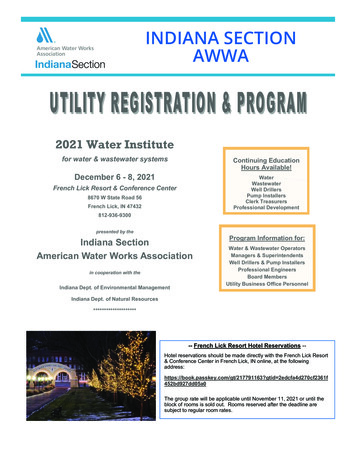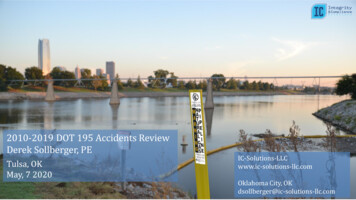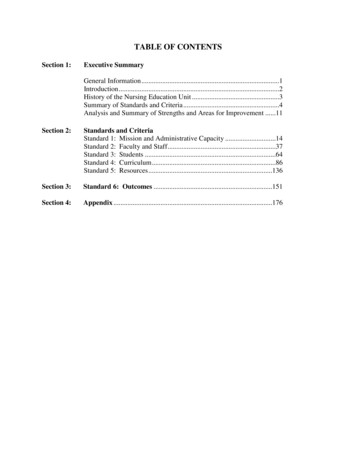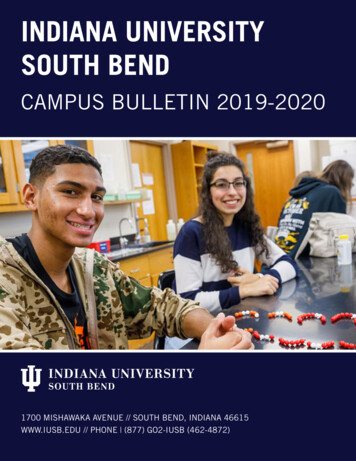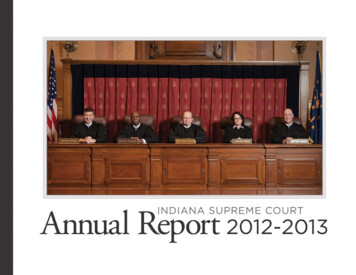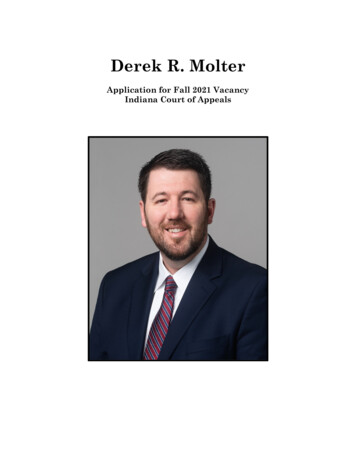
Transcription
Derek R. MolterApplication for Fall 2021 VacancyIndiana Court of Appeals
Derek MolterApplication for Fall 2021 VacancyIndiana Court of AppealsPart One, Sections 1-111. Contact/General InformationA. Full legal name and any former names.Derek Read MolterB. State the full name (use initials for minor children), age, and relationship of eachperson residing in your household. For each adult living in the household (otherthan yourself), also state the person’s occupation and employer.Katie Kristine Molter (spouse) – Age 39 – Attorney representing veteransat Molter Law LLCM.D.M. (child); age 10S.R.M. (child); age 8M.C.M. (child); age 5C. Business address, email, and telephone number.Ice Miller LLPOne American SquareSuite 2900Indianapolis, IN 46282derek.molter@icemiller.com(317) 236-2193D. Attorney number.27260-531
Derek MolterIndiana Court of AppealsFall 2021 VacancyE. Month and year you were admitted to the Indiana Bar.October 2007a. Indicate current law license status (i.e. active/inactive/retired).Activeb. If you are or have been a member of the Bar of any other state, identify thejurisdiction and provide date(s) of admission and current license status.I was admitted to the Bar in Washington, D.C. on December 8, 2008,where my license remains active and I continue to litigate matters.I am also admitted to practice (and have represented clients) in thefollowing federal courts:Supreme Court of the United States (4/23/18)U.S. Court of Appeals for the Second Circuit (8/26/16)U.S. Court of Appeals for the Third Circuit (3/12/19)U.S. Court of Appeals for the Seventh Circuit (5/13/15)U.S. Court of Appeals for the Tenth Circuit (6/4/15)U.S. Court of Appeals for the Federal Circuit (11/21/19)U.S. District Court for the District of Colorado (6/25/15)U.S. District Court for the District of Columbia (10/3/11)U.S. District Court for the Central District of Illinois (4/28/14)U.S. District Court for the Northern District of Indiana (10/19/07)U.S. District Court for the Southern District of Indiana (10/19/07)U.S. District Court for the Eastern District of Michigan (7/20/15)U.S. Court of Federal Claims (11/20/19)F. Date and place of birth.Lafayette, Indiana; February 16, 1982G. County of current residence and date you first became a resident.Marion County; January 20132
Derek MolterIndiana Court of AppealsFall 2021 Vacancy2. Secondary Education/Military ExperienceA. List all undergraduate colleges and universities you attended. Include the schoolname; dates enrolled; degree or certificate earned; and any academic honors,awards, or scholarships you received and when.Indiana UniversityDates Enrolled: 2001–2004Degree: B.A. (High Distinction)Academic Honors and Awards:Mortar Board Honor Society (2003)Phi Betta Kappa Honor Society (2004)Scholarships: Distinguished Alumni Scholar Award (2004)Marquette UniversityDates Enrolled: 2000 (Fall Semester)Degree: N/A (transferred to Indiana University)Scholarships: Sara Scott ScholarshipB. Include with your original application a certified transcript from each schoolnamed in Subsection 2A, and attach copies of each transcript to each applicationcopy. (If your social security number is on your transcripts, redact it beforecopying.)Certified transcript is attached.C. If applicable, list any military service. Include the name of the military branch;dates of service; last rank achieved; and any honors, awards, or commendationsreceived and when. Attach a copy of your Certificate of Release or Discharge fromactive duty (“DD 214” paperwork).N/A3
Derek MolterIndiana Court of AppealsFall 2021 Vacancy3. Post-Secondary EducationA. List all law schools, graduate schools, and post-J.D. programs attended. Includethe school name; dates enrolled; degree or certificate earned; class rank; and anyacademic honors, awards, or scholarships you received and when.Indiana University Maurer School of LawDates Enrolled: 2004–2007Degree: J.D. (magna cum laude)Class Rank: Top 3% (5/200)Academic Honors and Awards:CALI Award for Highest Grade in Criminal Law (2004)Scribe Award for Top Student in Legal Writing (2005)CALI Award for Highest Grade in Constitutional Litigation (2006)CALI Award for Highest Grade in Law Firm as a BusinessOrganization (2006)Moot Court Competition Quarterfinalist (2006)Indiana Law Journal, Executive Notes & Comments Editor (2007)Order of the Coif Honor Society (2007)Scholarships: F.C. Turrell Scholarship (2006)B. Include with your original application a certified transcript from each schoolnamed in Subsection 3A, and attach copies of each transcript to each applicationcopy. (If your social security number is on your transcripts, redact it beforecopying.)Certified transcript is attached.4. EmploymentA. Provide your employment history since graduation from college. Include name ofemployer, titles or positions, locations, and dates of employment.4
Derek MolterIndiana Court of AppealsFall 2021 Vacancy2013–PresentIce Miller LLPOne American Square, Suite 2900Indianapolis, IN 46282Associate (2013–2015)Partner (2016–Present)2008–2012Arnold & Porter LLP (now Arnold & Porter Kaye Scholer LLP)601 Massachusetts Avenue, NorthwestWashington, D.C. 20001Associate2007–2008Honorable Theresa L. SpringmannU.S. District Court for the Northern District of Indiana1300 South Harrison StreetFort Wayne, IN 46802Law ClerkSummer 2006Arnold & Porter LLP (now Arnold & Porter Kaye Scholer LLP)601 Massachusetts Avenue, NorthwestWashington, D.C. 20001Summer AssociateSummer 2005United States House of RepresentativesCommittee on the Judiciary2138 Rayburn House Office BuildingWashington, D.C. 20515Legal InternB. If applicable, describe the nature and extent of your practice of law (present andformer), and provide the names of your partners, associates, office mates, andemployers.CURRENT EMPLOYMENTIce Miller LLP (2013–Present): I am a partner in the Litigation PracticeGroup and lead our appellate practice at Ice Miller. The firm was founded inIndianapolis and now has offices in the Midwest and on the East Coast. Becausethere are a few hundred lawyers, and because my practice group also has dozens oflawyers, I cannot list them all here. But a searchable list is available at:5
Derek MolterIndiana Court of AppealsFall 2021 . The chair of my practice group isGeorge Gasper.I have a balanced civil practice at Ice Miller. My clients include plaintiffsand defendants; individuals and businesses; government entities and clientspursuing claims against, or defending claims by, government entities. Onoccasion, my clients are courts confronting their own separation-of-powers andfederalism issues. For example, I represented a city court when the city’slegislative body decided to abolish the court during the incumbent judge’s term.When a federal magistrate judge ordered a non-party state court to produceconfidential juvenile records, I represented the state court in objecting to thatorder in proceedings before the federal district judge.Much of my practice is in state and federal appellate courts around thecountry. For example, in the last several months I have presented oral arguments(a) in the Indiana Supreme Court for a plaintiff seeking to reverse a summaryjudgment against it based on the statute of limitations and asking the Court todetermine how Hughley v. State applies to the adverse domination and continuousrepresentation doctrines; (b) in the Indiana Court of Appeals for a petitionerappellee utility company involving the review of an administrative agency’sdecision setting the rates the utility may charge; and (c) in the U.S. Court ofAppeals for the Federal Circuit in Washington, D.C. on behalf of a plaintiffappellant hospital alleging that the United States wrongfully “deobligated”disaster relief funds following an audit by FEMA’s inspector general.My practice in the trial and appellate courts has covered a number ofsubject matters, including corporate law, contract disputes, data privacy, ERISA,alcoholic beverage regulation, insurance coverage, constitutional challenges tostatutes and ordinances, international stock lending, environmental law, personalinjury and wrongful death, product liability, fraud claims, trade secrets,employment law, zoning, trusts and estates, guardianships, Medicare SecondaryPayor Act, FOIA and other sunshine laws, utilities regulation, private actionsunder the Telephone Consumer Protection Act, tax litigation, indemnity claims,and real estate litigation.As a partner, I am active in the firm’s administrative responsibilities,confronting challenges that also confront the judiciary. For example, I recentlychaired our firm’s Technology Adoption Committee, helping coordinate projects forselecting and rolling out new technology, as well as selecting and negotiating withlegal research vendors. I am also active in our firm’s mentoring programs, and Irecently served on a training task force addressing the challenges in trainingattorneys while working remotely.6
Derek MolterIndiana Court of AppealsFall 2021 VacancyPREVIOUS EMPLOYMENTArnold & Porter LLP (2008–2012): For my first several years in privatepractice, I was an associate in the litigation group at Arnold & Porter. The firmwas founded in Washington, D.C. and has grown to around 1,000 lawyers in officesaround the world. A searchable list of the firm’s attorneys is available athttps://www.arnoldporter.com/en/people. Two of the partners in my practice groupwith whom I worked the most were Geoff Michael and Jon Stern.My office was in Washington, D.C., but I worked on cases in state andfederal trial and appellate courts around the country. That included handling factinvestigations, drafting pleadings, managing discovery, taking depositions, jurytrials, and pursuing appeals. For most of my time there, I was part of a team oflawyers who devoted much of their practice to appellate preservation issues. Asjust one example, I was often part of an “on call” schedule where attorneys in trialcould call at any time—day or night—for assistance in dealing with issues thatcame up in trial, which often entailed rapid analysis, research, and motiondrafting. Sometimes this even involved seeking emergency relief in appellatecourts.Two aspects of the firm’s culture which were impactful (and which Ice Millershares) were the firm’s commitment to pro bono work and its support of attorneystransitioning into public service. The firm’s most notable pro bono case wasGideon v. Wainwright, 372 U.S. 335 (1963), the seminal U.S. Supreme Court caseestablishing that the Sixth Amendment requires the government to provide acriminal defendant with an attorney if the defendant is unable to afford one. Itsmost notable alumni who went on to devote their careers to public service areformer Justice Abe Fortas and Attorney General Merrick Garland.Law Clerk to the Honorable Theresa L. Springmann (2007–2008):My first job after law school was as a law clerk to Judge Springmann, a U.S.District Judge for the Northern District of Indiana. She presided in Fort Wayne atthe time, but now she presides in Hammond. I prepared draft opinions, draftedjury instructions, researched legal issues, assisted with trials, and analyzed theFederal Sentencing Guidelines.Beyond the legal lessons, the experience was impactful in observing howJudge Springmann managed her court, her docket, and her chambers. She tookvery seriously her responsibility to ensure parties received their day in court, andshe enjoyed fulfilling her role in the trial process. She developed a workenvironment where we all operated as a team, which encouraged people to sharetheir thoughts and learn from one another. Also, because the environment wascollaborative rather than fearful, we also identified and fixed mistakes more7
Derek MolterIndiana Court of AppealsFall 2021 Vacancyquickly and effectively. The most important takeaway from the clerkshipexperience was that Judge Springmann ensured we went about our work with anunderstanding that we served the parties and the public, not the other wayaround.U.S. House of Representatives Committee on the Judiciary(Summer 2005): During law school, I worked as a legal intern on the JudiciaryCommittee, and my office was in Washington, D.C. with the Subcommittee onCrime, Terrorism, and Homeland Security. My responsibilities included legalresearch, factual research, preparing press materials, drafting memoranda, anddrafting proposed questions and statements for committee members to use duringcommittee hearings.The most significant legislative issues the committee considered were thereauthorization of the USA PATRIOT Act, the enactment of the Sex OffenderRegistration and Notification Act, and the expansion of mandatory minimumsentences. Constant throughout the work was debate over not only the best policyapproaches to the most vexing public safety issues, but the appropriate roles forvarious institutions within our separation-of-powers and federalist structure. Myboss even lost his job midway through the internship as a result of the committeerunning afoul of the separation of powers.Amidst the debate over mandatory minimum sentences, the committee’schairman wrote a letter to the Seventh Circuit explaining that, as part of thecommittee’s oversight, the chairman had concluded that a criminal defendantreceived too low a sentence in both the district court and on appeal, and theSeventh Circuit promptly needed to correct the sentence sua sponte (on its own).It is unusual for Congress to write a letter to a court telling the court how tohandle sentencing in a particular case. The letter became public, the publicbacklash was swift and severe, and my supervising attorney landed on the sword.See Sam Singer, Congress aide becomes casualty of controversy, Chicago Tribune,July 26, 2005, available at 26-0507260172-story.html. Notably, that attorney was not a neophyte; he was atwenty-year veteran of the Department of Justice and had served on theIndependent Counsel team investigating President Clinton. One of many lessons Ilearned from observing those events was that what gives the separation-of-powersdoctrine real force is that when the lines are crossed, neither the other institutionsnor the public will tolerate it.5. Trial/Judicial ExperienceA. Describe the extent of your jury trial experience, if any.8
Derek MolterIndiana Court of AppealsFall 2021 VacancyI have experienced jury trials through a variety of roles.As a law clerk, I assisted Judge Springmann—drafting jury instructions,verdict forms, and orders; managing exhibits; and legal research—when shepresided over several jury trials involving bank robberies, drug sales, tax fraud,and alleged constitutional violations against the State of Indiana. Each had itsown interesting story and procedural wrinkles. For example, in one trial aprisoner successfully represented himself suing the State, prevailing on hisallegation that a prison librarian wrongfully fired him from his prison job inretaliation for exercising his First Amendment right to voice concerns aboutprisoners’ access to legal resources. That required a difficult balance in ensuringthat the plaintiff’s rights were protected without the benefit of counsel, managingan efficient trial process with proper decorum, and avoiding placing a thumb onthe scale inadvertently even though the court necessarily had to take a moreactive role in the trial.In private practice I have worked on trial teams for multi-week personalinjury trials, handling witness preparation, assisting with jury research, handlingexhibit objections, preparing demonstrative exhibits, and motions practice. Likethe trials during my clerkship, each had interesting stories and trial surprises,like new facts requiring a mid-trial deposition. I have also been responsible forappellate preservation in dozens of trials that reached jury verdicts and appeals,managing critical motions practice, evidence objections, jury instructions, andother appellate preservation issues.Through all of these trials I have come to understand how our proceduresensure the participants receive a fair opportunity for their day in court regardlessof the outcome; that trials occur in a fast-pace, pressure-cooker environment; andthat a clear record is vital for review on appeal.B. Describe the extent of your bench trial experience, if any.As with jury trials, I assisted Judge Springmann with bench trials duringmy clerkship. As an associate at Ice Miller, I second chaired an arbitration in aninternational stock lending dispute between two business entities over tens ofmillions of dollars. An arbitration is not a bench trial in court, but there are somesimilarities (along with key differences). We exchanged document discovery,deposed witnesses, briefed and argued summary judgment, held a trial, andsubmitted proposed findings. I also routinely consult with my colleagues toprovide advice regarding procedural and appellate preservation issues, as well ascritical motions practice, for bench trials.9
Derek MolterIndiana Court of AppealsFall 2021 VacancyC. If applicable, describe the nature and extent of your judicial experience (includingas a judge pro tempore). Include a description of your experience presiding overjury trials, if any.I do not have judicial experience.6. Professional ExperienceInclude as writing samples, four selections (in total) from the writtenmaterials listed below in Subsections 6A – 6C.A. If applicable, list up to five trial or appellate briefs and/or judicial opinions youhave written. Refer to them by caption, case number, and filing date.1. Response to Petition to Transfer (Writing Sample #1)Elkhart Foundry & Machine Co. v. City of Elkhart Redevelopment CommissionCause No. 20A03-1709-CT-02136 (Indiana Supreme Court)Filed November 20, 2018This brief argued that the trial court and Court of Appeals applied the correctstatute of limitations, which did not bar the plaintiff’s claims, and that theSupreme Court should decline to review the decision through transfer.2. Brief of Appellant (Writing Sample #2)Arjo Inc. v. Handicare USA, Inc. (U.S. Court of Appeals for the Seventh Circuit)Cause No. 18-3479Filed February 26, 2019I represented the plaintiff in this trade secrets dispute. The brief argued thetrial court erred when it declined to issue a preliminary injunction enjoiningthe use of the plaintiff’s trade secrets.3. Response to Motion to Accept Jurisdiction Over Interlocutory Appeal(Writing Sample #3)Nautilus Insurance Company v. Lea-Max CorporationCause No. 02D09-1608-CT-394 (Indiana Court of Appeals)10
Derek MolterIndiana Court of AppealsFall 2021 VacancyFiled July 19, 2019I represented the insured in this insurance coverage dispute. The brief arguedthat the Court of Appeals should decline to accept jurisdiction over thisinterlocutory appeal of a trial court decision concluding the policy’s ownedproperty exclusion did not apply.4. Response to Petition to Transfer (Writing Sample #4)Vickery v. Ardagh Glass Inc.Cause No. 49A02-1702-PL-330 (Indiana Supreme Court)Filed February 6, 2018This brief argued that the Supreme Court did not violate the IndianaConstitution when it created the Commercial Court and that the CommercialCourt properly issued an injunction in this trade secret case.5. Appellant’s BriefColumbus Regional Hospital v. United StatesCause No. 20-1226 (U.S. Court of Appeals for the Federal Circuit)Filed April 8, 2020This brief argued that the Court of Federal Claims erred when it dismissed theplaintiff’s claims for lack of jurisdiction and when it prematurely resolvedfactual disputes at the pleadings stage.B. If applicable, list up to five legislative drafts or court rules you have written or towhich you contributed significantly. Refer to them by official citation, date, andsubject matter.In 2017, I wrote an article titled For the Record: District Court Clerks’Differing Protocols for Preparing the Record on Appeal in the Seventh Circuit.The article explained the rules then in effect for preparing the record on appeal inthe Seventh Circuit. While preparing the record was primarily an administrativetask for the appellant, it was a critical task because the appeal is limited to thatrecord. Yet, the interplay between the Federal Rules of Appellate Procedure, thelocal Circuit Rules, and the even more local district court rules were confusing,and this was made worse by the fact that each clerk’s office had its ownunpublicized protocol for completing its role in the record preparation process.After gathering information from each clerk’s office, the article provided a district11
Derek MolterIndiana Court of AppealsFall 2021 Vacancyby-district explanation and suggested that the rules should be updated tostreamline the process (especially now that in most cases the record is alreadyavailable through the courts’ online dockets).The Seventh Circuit’s rules committee then made that change. Now, CircuitRule 10 provides that within 14 days of a notice of appeal, the district courtensures that the electronic docket is complete and available to the appellate court,and then the appellant also checks to confirm the same.This is a more significant change than it seems at first blush. These sorts oftraps for the unwary—especially where the process for critical judicial functionsare not public—can make litigation surprisingly more expensive, and it diminishesaccess to justice.C. If applicable, list up to five of your contributions to legal journals or other legalpublications. Provide titles, official citations, and a brief description of the subjectmatter.1. Data Breach Standing: U.S. Supreme Court Declines to Revisit DataBreach Injury Debate, Pratt’s Privacy and Cybersecurity Law Report,July–August 2019, Vol. 5 (LexisNexis)This article explained that in data security litigation standing remains asignificant threshold issue, and litigants continue to debate whether a databreach or unauthorized disclosure alone constitutes sufficient injury to conferstanding. The article also discussed a circuit split and the growing pressure onthe U.S. Supreme Court to revisit data breach standing.2. Can the Government Force You to Unlock Your Smartphone?Bloomberg Law, May 29, 2019This article explained that state and federal courts were grappling with how toapply centuries-old constitutional principles to modern technology andpreviewed a case then pending in the Indiana Supreme Court (Seo v. State),which confronted the issue of whether it violated the Fifth Amendment’sprotection against self-incrimination to compel someone to unlock an iPhone.3. For the Record: District Court Clerks’ Differing Protocols forPreparing the Record on Appeal in the Seventh Circuit, The AppellateAdvocate, 2017This article explained the Seventh Circuit’s rules for preparing the record onappeal, provided a summary of the practices in each clerk’s office throughout12
Derek MolterIndiana Court of AppealsFall 2021 Vacancythe circuit in administering the rule (which varied greatly), and suggested thata rule change would improve the process.4. Recent Challenges to States’ Alcoholic Beverage Regulation, Fall 2015Agriculture and Food Committee Newsletter, ABA Section of AntitrustLaw, Vol. 6/No.1This article provided a brief overview of recent litigation challenging variousStates’ regulation of alcohol sales and the difficulty courts confront inreconciling States’ authority under the Twenty-first Amendment with the U.S.Constitution’s other limitations on the States’ power.5. Pleading Affirmative Defenses After Twombly and Iqbal, Circuit Rider,May 2014Seminal U.S. Supreme Court decisions called Twombly and Iqbal refined thepleading requirements in federal court, requiring that to survive a motion todismiss plaintiffs must plead enough facts to establish that a right to recoveryis plausible, not just conceivable. It is unsettled whether a similar standardapplies to affirmative defenses, and this article provided an overview of thedifferent views among federal district courts.D. Identify the five most significant legal matters entrusted to you, whether as ajudge or lawyer, and describe why you believe them to be so.1. Laurie Campbell v. Tabitha Walters et al., Cause No. 41D01-1504PL-000037 (Johnson Superior Court 1).Tyler Deputy was walking along the side of the road on the outskirts ofWhiteland, Indiana late on a Saturday afternoon. Tabitha Walters was drivingdown that same road to a family function after spending more than six hoursdrinking at a small bar in downtown Indianapolis. After swerving across bothlanes, she struck and killed Tyler. He was 19, and he was survived by his fiancéeand their 13-month old daughter. As the personal representative of his estate, hismother retained me to pursue claims against the drunk driver and the bar thatoverserved her, and to obtain a recovery that would help take care of Tyler’sdaughter. In the end, we reached a settlement that provided substantial resourcesfor Tyler’s daughter.The case is significant because of its impact on the lives of Tyler’s family.This was especially meaningful to me because I have children that are roughly thesame age as Tyler’s daughter, and her birthday is just four days before my son’sbirthday.13
Derek MolterIndiana Court of AppealsFall 2021 VacancyThe case is also significant for the challenges it presented, and the aspectsof legal practice it illustrated. For example, the civil case and related criminalproceedings were intertwined, which sometimes helped (issue preclusion),sometimes hurt (delay), and sometimes did a little of both (the driver invoking theFifth Amendment). The driver had no assets, so holding her liable would notprovide any meaningful recovery, and it can be more difficult to establish that abar serving a driver is liable for a drunk driving accident than it is to establish thedriver’s liability (and can be even more difficult to establish the bar has more faultthan the driver). Fortunately, the bar had an insurance policy for this sort ofincident, but that also meant the insurance company was well-practiced in themost effective defenses. Regardless, through discovery, we marshalled acompelling case for the bar’s liability and degree of fault, ultimately demonstratingthe driver was a well-known customer at the bar and was visibly intoxicated whenshe left. We were also creative in our legal theories, not just relying on thetraditional claims of negligence and dram shop (the statutory claim for servingsomeone who is visibly intoxicated), but also pleading claims for nuisance and theviolation of a much less frequently used statute which prohibits serving “habitualdrunkards.”2. Columbus Regional Hospital v. United States, Cause No. 1:18-cv01299 (U.S. Court of Appeals for the Federal Circuit).I was engaged on appeal to represent the Columbus Regional Hospital, whichsued the United States for roughly 10 million in disaster relief funds that thefederal government “deobligated” following a FEMA audit. In 2008, historicflooding in southern Indiana caused over 200 million in damage to the hospital,and after President Bush declared this a “major disaster” under the Stafford Act,FEMA awarded roughly 100 million in grant aid to the hospital. However, afteran audit, FEMA concluded the hospital had not properly bid some of the work,and, as a result, FEMA “deobligated” (took back) roughly 10 million. Thehospital sued in the U.S. Court of Federal Claims alleging (among other things)that the applicable grant agreement was a contract, and that FEMA breached thecontract when it deobligated the funds in violation of certain statutes andregulations that had been incorporated as terms of the grant agreement.The United States argued that FEMA grant agreements reflect gifts ratherthan contractual obligations; that even if there were a contract, the contract waswith the State of Indiana as the grantee, not the hospital as a sub-grantee; andthat even if the hospital had a claim, it should have sued in a federal district courtunder the Administrative Procedures Act instead of filing a contract claim in theCourt of Federal Claims. The Court of Federal Claims—which has exclusivejurisdiction over contract claims against the United States—dismissed the14
Derek MolterIndiana Court of AppealsFall 2021 Vacancyhospital’s complaint, concluding it lacked jurisdiction over the claims because itagreed there was no contractual relationship between the hospital and FEMA.The questions were significant enough that during oral argument theFederal Circuit extended the argument time for both sides. Following argument,the Federal Circuit reversed with a unanimous opinion. The appellate courtagreed with our arguments that the Court of Federal Claims was the proper courtwith jurisdiction, that the grant agreement between FEMA and the State was acontract rather than a gift, and that the hospital was a third-party beneficiary tothe grant agreement between the State of Indiana and FEMA.This is a significant matter in a few respects. For the hospital, it is ofcourse significant because they can now pursue their claim in the trial court.Beyond the hospital’s immediate interests, the case reflects important legaldevelopments for disaster relief aid, which of course is a timely issue during theCovid pandemic. For me personally, the case reflects one of the aspects of mypractice I enjoy the most: picking up a case on appeal and figuring out the bestway to focus the arguments.3. City of Marion v. London Witte Group, LLC, Cause No. 20S-MI00567 (Indiana Supreme Court).This is a case I recently argued in the Indiana Supreme Court, representinga plaintiff-appellant seeking to reverse a summary judgment that was enteredagainst it based on the statute of limitations. Since the case is pending, I’ll borrowthe Supreme Court’s own description of the case from its website archiving theoral argument:In 2016, the City of Marion filed a complaint in Grant SuperiorCo
Arnold & Porter LLP (now Arnold & Porter Kaye Scholer LLP) 601 Massachusetts Avenue, Northwest Washington, D.C. 20001 Associate 2007-2008 Honorable Theresa L. Springmann U.S. District Court for the Northern District of Indiana 1300 South Harrison Street Fort Wayne, IN 46802 Law Clerk Summer 2006
